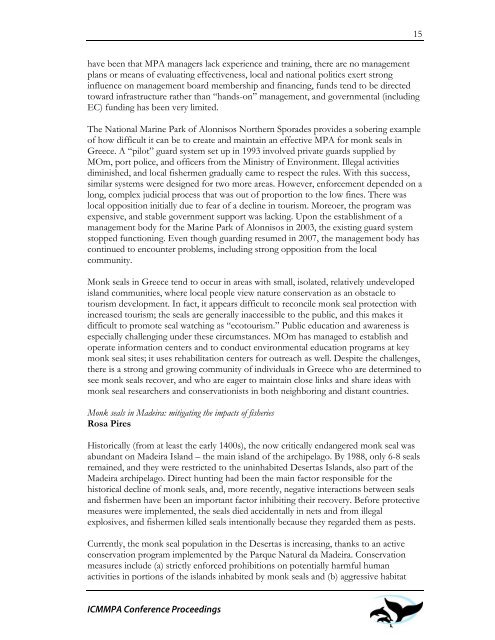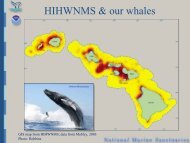The First International Conference on Marine Mammal Protected Areas
The First International Conference on Marine Mammal Protected Areas
The First International Conference on Marine Mammal Protected Areas
You also want an ePaper? Increase the reach of your titles
YUMPU automatically turns print PDFs into web optimized ePapers that Google loves.
have been that MPA managers lack experience and training, there are no management<br />
plans or means of evaluating effectiveness, local and nati<strong>on</strong>al politics exert str<strong>on</strong>g<br />
influence <strong>on</strong> management board membership and financing, funds tend to be directed<br />
toward infrastructure rather than “hands-<strong>on</strong>” management, and governmental (including<br />
EC) funding has been very limited.<br />
<str<strong>on</strong>g>The</str<strong>on</strong>g> Nati<strong>on</strong>al <strong>Marine</strong> Park of Al<strong>on</strong>nisos Northern Sporades provides a sobering example<br />
of how difficult it can be to create and maintain an effective MPA for m<strong>on</strong>k seals in<br />
Greece. A “pilot” guard system set up in 1993 involved private guards supplied by<br />
MOm, port police, and officers from the Ministry of Envir<strong>on</strong>ment. Illegal activities<br />
diminished, and local fishermen gradually came to respect the rules. With this success,<br />
similar systems were designed for two more areas. However, enforcement depended <strong>on</strong> a<br />
l<strong>on</strong>g, complex judicial process that was out of proporti<strong>on</strong> to the low fines. <str<strong>on</strong>g>The</str<strong>on</strong>g>re was<br />
local oppositi<strong>on</strong> initially due to fear of a decline in tourism. Moreoer, the program was<br />
expensive, and stable government support was lacking. Up<strong>on</strong> the establishment of a<br />
management body for the <strong>Marine</strong> Park of Al<strong>on</strong>nisos in 2003, the existing guard system<br />
stopped functi<strong>on</strong>ing. Even though guarding resumed in 2007, the management body has<br />
c<strong>on</strong>tinued to encounter problems, including str<strong>on</strong>g oppositi<strong>on</strong> from the local<br />
community.<br />
M<strong>on</strong>k seals in Greece tend to occur in areas with small, isolated, relatively undeveloped<br />
island communities, where local people view nature c<strong>on</strong>servati<strong>on</strong> as an obstacle to<br />
tourism development. In fact, it appears difficult to rec<strong>on</strong>cile m<strong>on</strong>k seal protecti<strong>on</strong> with<br />
increased tourism; the seals are generally inaccessible to the public, and this makes it<br />
difficult to promote seal watching as “ecotourism.” Public educati<strong>on</strong> and awareness is<br />
especially challenging under these circumstances. MOm has managed to establish and<br />
operate informati<strong>on</strong> centers and to c<strong>on</strong>duct envir<strong>on</strong>mental educati<strong>on</strong> programs at key<br />
m<strong>on</strong>k seal sites; it uses rehabilitati<strong>on</strong> centers for outreach as well. Despite the challenges,<br />
there is a str<strong>on</strong>g and growing community of individuals in Greece who are determined to<br />
see m<strong>on</strong>k seals recover, and who are eager to maintain close links and share ideas with<br />
m<strong>on</strong>k seal researchers and c<strong>on</strong>servati<strong>on</strong>ists in both neighboring and distant countries.<br />
M<strong>on</strong>k seals in Madeira: mitigating the impacts of fisheries<br />
Rosa Pires<br />
Historically (from at least the early 1400s), the now critically endangered m<strong>on</strong>k seal was<br />
abundant <strong>on</strong> Madeira Island – the main island of the archipelago. By 1988, <strong>on</strong>ly 6-8 seals<br />
remained, and they were restricted to the uninhabited Desertas Islands, also part of the<br />
Madeira archipelago. Direct hunting had been the main factor resp<strong>on</strong>sible for the<br />
historical decline of m<strong>on</strong>k seals, and, more recently, negative interacti<strong>on</strong>s between seals<br />
and fishermen have been an important factor inhibiting their recovery. Before protective<br />
measures were implemented, the seals died accidentally in nets and from illegal<br />
explosives, and fishermen killed seals intenti<strong>on</strong>ally because they regarded them as pests.<br />
Currently, the m<strong>on</strong>k seal populati<strong>on</strong> in the Desertas is increasing, thanks to an active<br />
c<strong>on</strong>servati<strong>on</strong> program implemented by the Parque Natural da Madeira. C<strong>on</strong>servati<strong>on</strong><br />
measures include (a) strictly enforced prohibiti<strong>on</strong>s <strong>on</strong> potentially harmful human<br />
activities in porti<strong>on</strong>s of the islands inhabited by m<strong>on</strong>k seals and (b) aggressive habitat<br />
ICMMPA <str<strong>on</strong>g>C<strong>on</strong>ference</str<strong>on</strong>g> Proceedings<br />
15



